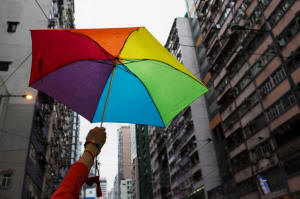|
Hong
Kong to host 2022 Gay Games as LGBT acceptance grows in parts of
Asia
 Send a link to a friend
Send a link to a friend
 [October 31, 2017]
By Venus Wu and Pak Yiu [October 31, 2017]
By Venus Wu and Pak Yiu
HONG KONG (Reuters) - Hong Kong will
host the 2022 Gay Games, fighting off bids from cities in the United
States and Mexico to become the first Asian city to stage the sports
and cultural event.
The win comes amid growing momentum for the gay rights movement in
Asia, with Taiwan's constitutional court this year declaring that
same-sex couples have the right to marry, the region's first such
ruling.
The games are expected to attract more than 15,000 participants and
provide a HK$1-billion ($128-million) boost to the economy, the Hong
Kong bid team said in a statement.
Bid supporters called the decision a victory for the status of the
city's lesbian, gay, bisexual and transgender community.
"This is a big step forward for Hong Kong itself to be able to win
this world game ... and it is also a big step for diversity
inclusion," said Alfred Chan, chairman of Hong Kong's Equal
Opportunities Commission, which supported the bid.

The Federation of Gay Games (FGG) chose Hong Kong over Guadalajara
in Mexico and Washington D.C., in a vote in Paris on Monday. A
record 17 cities had expressed interest in hosting the 2022 Gay
Games, 13 in the United States.
"The impact that the Gay Games has in host cities is incredible in
terms of culture, sport, economic impact, history and most
importantly, elevating all matters of LGBT+ equality," the
Federation of Gay Games said in a statement.
The games are touted as the largest lesbian, gay, bisexual, and
transgender global sports and cultural gathering. Participants do
not have to be gay, organizers said.
Hong Kong, a cosmopolitan former British colony, returned to Chinese
rule in 1997 under a "one country, two systems" formula that
promises it a high degree of autonomy and freedoms not enjoyed on
the mainland.
There is no law against discrimination based on sexual orientation
and gay marriage is not recognized in the territory.
"I don't feel any discrimination. But of course I know some out
there (do)," said 46-year-old Hong Kong resident Eddie Leung, who
participated in the Gay Games in Sydney 15 years ago.
[to top of second column] |

A participant holds a rainbow umbrella as he attends a lesbian, gay,
bisexual and transgender (LGBT) Pride Parade in Hong Kong November
8, 2014. Participants from the LGBT communities took to the streets
on Saturday to demonstrate for their rights. REUTERS/Tyrone Siu/File
Photo

"That's why we need to fight."
The Hong Kong government "notes" the choice of the city to host the
Games, it said in a statement to Reuters.
"The government is committed to promoting equal opportunities and
fostering in the community the culture and values of inclusiveness
and mutual respect," it added.
The Hong Kong bid team was supported by numerous corporations,
including airline Cathay Pacific, financial services company Credit
Suisse Hong Kong Limited and law firm Linklaters LLP.
The city's lesbian, gay, bisexual and transgender community marked a
political victory in September, when an appeals court ruled that a
British lesbian whose partner worked in the city should receive a
spousal visa.
Homosexuality is not illegal in mainland China, but was regarded as
a mental disorder until as recently as 2001. Many large cities have
thriving gay scenes, but many gay individuals still face family and
social pressure to marry and have children.
The 2018 Gay Games will take place in Paris from August 4 to 12,
featuring 36 sports, 14 cultural events, an academic conference,
with up to 15,000 participants from 70 countries.
The Gay Games was conceived by Tom Waddell, an Olympic decathlete,
and was first held in San Francisco in 1982.
(Reporting by Venus Wu and Pak Yiu; Additional reporting by Anne
Marie Roantree; Editing by Sam Holmes and Clarence Fernandez)
[© 2017 Thomson Reuters. All rights
reserved.] Copyright 2017 Reuters. All rights reserved. This material may not be published,
broadcast, rewritten or redistributed.
 |